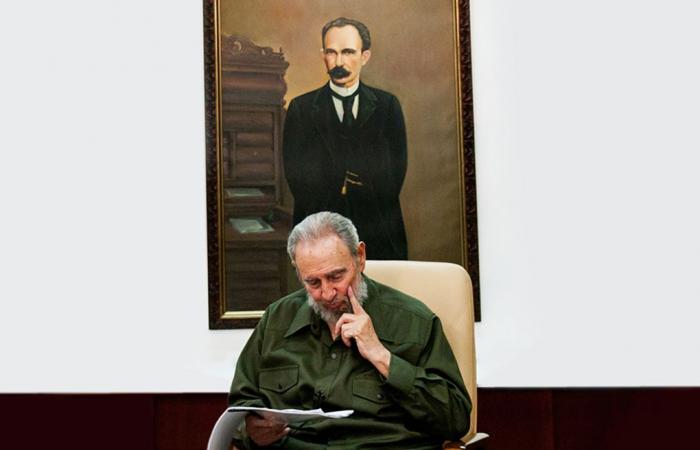Under the seal of the Letras Cubanas Publishing House and in digital format, the book was published in 2023. Fidel and the Cuban publishing industry: a Revolution from letters. Its authors, professors from the University of Havana Francisca López Civeira and Fabio E. Fernández Batista, thereby make a reality—as the note to the reader states—a request from the president of the Cuban Book Institute, Juan Rodríguez, for a text capable of to present the dimension of Fidel Castro as the main driver of editorial development and reading in Cuba after the revolutionary triumph. Both undertook the investigation of a known but at the same time little studied facet of the leader of the Cuban Revolution, an endeavor in which they also received the encouragement of the late Hermes Moreno, director of the Nuevo Milenio Editorial.
The book is based on a presentation of the Cuban publishing panorama and the reading capacity of the Cuban population in the mid-20th century. Illiteracy, prevalent especially in rural areas, the low level of education evidenced by school dropout rates, as well as a small and lucrative group of publishers became obstacles to mass access to books in a scenario of unemployment and low income. for certain segments of the population. It cannot be lost sight of that these phenomena, also evidence of the structural crisis of the bourgeois neocolonial republic, were a natural result of the absence of solid public policies regarding education and culture.
This situation, generally called “the problem of education,” was presented by Fidel Castro in History Will Absolve Me as one of the fundamental issues whose transformation the Revolution aimed to transform. In later programmatic documents, such as Manifesto No.1 of the July 26 Movement to the People of Cuba and the Sierra Maestra Manifesto, there are allusions to the need to promote educational development, while experiences in the insurrectionary struggle such as the Department of Education of the Second Eastern Front Frank País show concern about this issue.
Fidel Castro’s interest in expanding the level of education of the people, both as a basis for the promotion of reading and as a means for their intellectual and spiritual advancement, can be seen in multiple interventions at the dawn of the revolutionary government, of which are cited some fragments in the book and which is summarized in the expression: “we do not tell the people: believe! We tell him: read!”
The victory of January 1, 1959 opened enormous possibilities for the realization of these aspirations and the creation of the National Printing Press, in the midst of an emergence of cultural institutions that followed the victory, was an expression of the future that was being configured for the publishing universe and reading, also hand in hand with a gigantic educational effort and a decrease in the price of books. The number of publishers and circulations, as well as the thematic variety, expanded during the 1960s in correspondence with the formation of a progressively educated public with high expectations, as well as the demands motivated by the growing scientific and educational development of the country. An example of this were the Revolutionary Editions, a project that emerged in 1965 and was intended to cover bibliographic needs in the university environment.
The Jiribilla
THE OPINION
THE LOOK
DIGITAL CHANNEL
DOSSIER
NEWS
INTERVIEWS
COLUMNS
LIBRARY
NOTES ON FIDEL CASTRO AND THE DEVELOPMENT OF THE BOOK IN CUBA
By: Alejandro Sánchez / Image: Courtesy of Editorial Letras Cubanas
6/12/2024
NOTES ON FIDEL CASTRO AND THE DEVELOPMENT OF THE BOOK IN CUBA
By: Alejandro Sánchez / Image: Courtesy of Editorial Letras Cubanas
6/12/2024
NOTES ON FIDEL CASTRO AND THE DEVELOPMENT OF THE BOOK IN CUBA
By: Alejandro Sánchez / Image: Courtesy of Editorial Letras Cubanas
6/12/2024
NOTES ON FIDEL CASTRO AND THE DEVELOPMENT OF THE BOOK IN CUBA
By: Alejandro Sánchez / Image: Courtesy of Editorial Letras Cubanas
6/12/2024
NOTES ON FIDEL CASTRO AND THE DEVELOPMENT OF THE BOOK IN CUBA
By: Alejandro Sánchez / Image: Courtesy of Editorial Letras Cubanas
6/12/2024
Under the seal of the Letras Cubanas Publishing House and in digital format, the book Fidel and the Cuban publishing industry: a Revolution from the letters was published in 2023. Its authors, professors from the University of Havana Francisca López Civeira and Fabio E. Fernández Batista, thereby make a reality—as the note to the reader states—a request from the president of the Cuban Book Institute, Juan Rodríguez, for a text capable of to present the dimension of Fidel Castro as the main driver of editorial development and reading in Cuba after the revolutionary triumph. Both undertook the investigation of a known but at the same time little studied facet of the leader of the Cuban Revolution, an endeavor in which they also received the encouragement of the late Hermes Moreno, director of the Nuevo Milenio Editorial.
The book is based on a presentation of the Cuban publishing panorama and the reading capacity of the Cuban population in the mid-20th century. Illiteracy, prevalent especially in rural areas, the low level of education evidenced by school dropout rates, as well as a small and lucrative group of publishers became obstacles to mass access to books in a scenario of unemployment and low income. for certain segments of the population. It cannot be lost sight of that these phenomena, also evidence of the structural crisis of the bourgeois neocolonial republic, were a natural result of the absence of solid public policies regarding education and culture.
This situation, generally called “the problem of education,” was presented by Fidel Castro in History Will Absolve Me as one of the fundamental issues whose transformation the Revolution aimed to transform. In later programmatic documents, such as Manifesto No.1 of the July 26 Movement to the People of Cuba and the Sierra Maestra Manifesto, there are allusions to the need to promote educational development, while experiences in the insurrectionary struggle such as the Department of Education of the Second Eastern Front Frank País show concern about this issue.
Fidel Castro’s interest in expanding the level of education of the people, both as a basis for the promotion of reading and as a means for their intellectual and spiritual advancement, can be seen in multiple interventions at the dawn of the revolutionary government, of which are cited some fragments in the book and which is summarized in the expression: “we do not tell the people: believe! We tell him: read!”
The victory of January 1, 1959 opened enormous possibilities for the realization of these aspirations and the creation of the National Printing Press, in the midst of an emergence of cultural institutions that followed the victory, was an expression of the future that was being configured for the publishing universe and reading, also hand in hand with a gigantic educational effort and a decrease in the price of books. The number of publishers and circulations, as well as the thematic variety, expanded during the 1960s in correspondence with the formation of a progressively educated public with high expectations, as well as the demands motivated by the growing scientific and educational development of the country. An example of this were the Revolutionary Editions, a project that emerged in 1965 and was intended to cover bibliographic needs in the university environment.
“The number of publishers and circulations as well as the thematic variety expanded during the 1960s, in correspondence with the formation of a progressively educated public…”
The performance of the Book Institute, created in 1966 and renamed the Cuban Book Institute the following year, the structuring of a network of thematic publishing houses and the development of productive capacities to produce million-dollar printing received the direct attention of the Commander in Chief, who outlined the conceptions of these processes and showed interest in the publication plan, even recommending titles. Starting in 1982, on a biennial basis until 1998, the first International Book Fairs in Havana were held in order to promote reading. The great achievements in the publishing field—thanks to a more favorable economic situation and government policy—suffered a severe contraction with the crisis that resulted from the collapse of real socialism.
In the midst of the difficult circumstances of the Special Period, Fidel did not stop communicating in different spaces his ideas about the books that should be published so that people could appropriate a general culture and take stock of the editorial development in the preceding decades, while He personally supervised the sector’s recovery strategies. The palpable although insufficient recovery of the economy at the beginning of the 21st century allowed it to put some of these dreams into practice through the Battle of Ideas programs, in which editorial production grew significantly to support the Territorial Editions System, initiatives such as University for All television courses and the proportions reached by an event like the International Book Fair.
The founding legal rules of the revolutionary publishing industry and the testimonies collected by the authors are included in the book as annexes. The inclusion of testimonial voices allows readers to interact directly with the story about different moments in the Cuban publishing world and Fidel Castro’s concern for its expansion. At the end of the book appear brief interviews with Ambrosio Fornet, Isabel Monal, Juanita Conejero, Rolando Rodríguez, Cira Romero, Juan Nicolás Padrón, Hassan Pérez, Omar González, Iroel Sánchez and Fernando Rodríguez Sosa. It is noteworthy how the testimonies of Rolando Rodríguez, founding president of the Book Institute, and Iroel Sánchez, its leader during the Battle of Ideas, show us the attention paid by Fidel to the Cuban publishing industry in its two most important moments.
With this book, Francisca López Civeira and Fabio E. Fernández Batista offer us a valuable approach to the understanding that a voracious reader like Fidel Castro had of the importance of promoting books and reading as a means of appropriating knowledge and training. of a conscience. The publishing industry of which he has been the architect has thus become one of the pivots of the cultural work of Cuban socialism.
Taken from La Jiribilla
Cover photo: Roberto Chile






